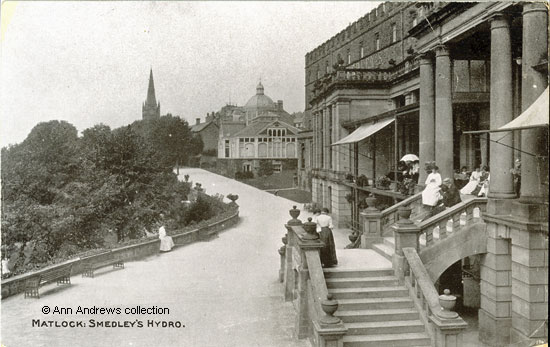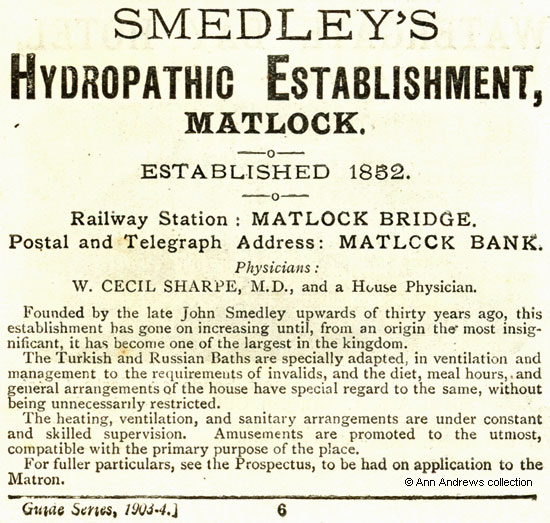|
Images Index> 20th & 21st Century, Matlock> This page |
| Matlock: Smedley's Hydro, early 1900s |
| Matlock : Twentieth Century Photographs, Postcards, Engravings & Etchings |
|
|||
"Smedley's Hydro at Matlock Bank is as much one of the wonders of Derbyshire as the ducal palace of Chatsworth or the baronial hall of Haddon. Of immense size, and of imposing appearance, the building, as regards its outside appearance, gives but little evidence of the stately beauty of the interior. The magnificent entrance hall, the long corridors with their cosy seats, the Corinthian dining hall, at which 300 visitors can be accommodated at dinner, the lovely drawing room, whose windows open into prettily arranged grounds with fair vistas of the scenery beyond, the snug reading room and library, the billiard room, all are planned on lines of elegance and good taste, and vast as the place is, and grand in the whole of its arrangements, there is yet in every room and corridor an air of cosiness and comfort that, even at first sight, transforms the place into a home. ... It is difficult to believe that "Smedley's", so vast and so superb, had its origin in a humble cottage built by the founder of modern hydropathy about half a century ago. But such was its simple beginning in the years when John Smedley preached the gospel of water"[1]. The twentieth century began with more proposals to extend the building. Plans were submitted to the Council for 45 new bedrooms with a bridge across Smedley Street. Smedley's latest project was estimated at costing up to £12,000 and the Council said that would come on the rates. The new bridge would be five feet higher than the one already there[2]. By the early summer of 1901 Smedley's was offering a "dark room for photographers"[3] and visitors were able to print their own films. It was still being advertised in 1910. This was almost certainly the former studio of Frederick and William Harvey Barber, who had a studio within Smedley's grounds from 1891. This was in addition to their own studio that had been built close by a few years earlier[4].
Robert Wildgoose, J.P., the previous chairman of the company, had died on the 1st of May[5]. The meeting desired "to express its deep regret at the loss sustained by the company ... and its high appreciation of his character and the zeal with which he presided over the affairs of the company for a long period of years"[6]. Later the same year the hydro's former Swiss chef died after a long and painful illness. Francois Guillaume Le Calvez passed away on 19 Oct 1900, leaving a widow and two daughters who were born in Matlock. He had occupied the responsible position for a number of years "to the entire satisfaction of the directors and the delight of the visitors"[7]. On a lighter note, a walking contest for the hydro's employees was organised in 1903. Seventeen started the course which was to Rowsley and back, a distance of about about 9½ miles. The start "was effected at 5.8, and George Woodhouse, the winner aged 17, finished at 6.99½". F. Turner, who had been in 5th place at Rowsley, came second and Richards was third[8]. The competitors probably ran in canvas shoes with thin bottoms which would have been hard on their feet and legs.
In June 1905 the death occurred in a motoring accident of of Mr. Joseph Crowther, who had been the Chairman of the Hydropathic Company since the death of Robert Wildgoose. He had joined the board in 1875, shortly after the company was formed. The vacancy of the board was filled by his brother Elon Crowther and Mr. Alfred Sykes replaced him as chairman[11].
|
|||
|
1. "Smedley's Hydro, Matlock". Valentine's Series, No. 41944. Printed in Great Britain Posted 16 Jul 1914 at Matlock and sent to Mr. Gravener, Ipswich. The photograph dates from 1904. 2. "Matlock: Smedley's Hydro". Published by Photochrom Co. Ltd., London. Posted on 26 Mar 1907 at Matlock. Sent to Harrogate. Personal message, but probably sent by a guest. 3. Advertisement from Ward Lock & Co's "Matlock & Dovedale, Bakewell", Illustrated Guide Books of England and Wales (1903-4). Images in the collection of, provided by and © Ann Andrews. Written, researched by and © Ann Andrews. Intended for personal use only. |
|||
References (coloured links are to transcripts and information elsewhere on this web site): [1] Ward Lock & Co's "Guide to Matlock, Dovedale, Etc.", Illustrated Guide Books of England and Wales (Guide Series 1903-4). [2] "Derbyshire Times", 18 June 1900. New buildings. [3] "Buxton Advertiser", 8 June 1901. Further adverts were published in the same paper up to June 1910. [4] See: Past Matlock & Matlock Bath photographers [5] "Derbyshire Times", 1 September 1900. Smedley's Hydro, Matlock. Great Success. [6] "Derbyshire Times", 15 September 1900. [7] "Derbyshire Times", 27 October 1900. He and his wife can be found in the 1891 census. Mr. Le Calvez can also be found amongst those before the magistrates. See: Vaccination Cases - August 1898 [8] "Derbyshire Courier", 4 July 1903. [9] "The Sheffield & Rotherham Independent", Thursday, 27 December, 1900. [8] "Derbyshire Courier", 2 January 1904. [11] "Derbyshire Courier",
9 September 1905. Mr. Crowther's motoring accident was reported in "Derbyshire
Times" on 17 June 1905. It was a sensation at the time. |












 Read the next stage in the hydro's
history,
Read the next stage in the hydro's
history,